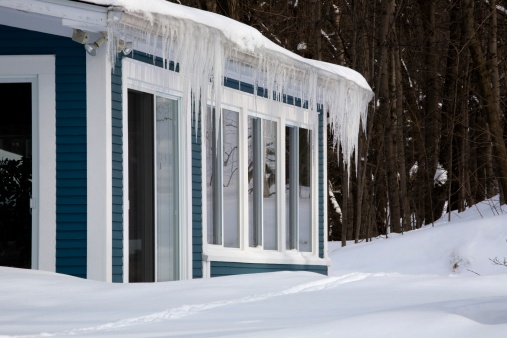 Extreme winter weather can be dangerous. Ask the millions of Americans who dealt with the frigid conditions caused by the Polar Vortex. From icy sidewalks to cars buried in snow, sometimes Mother Nature shows no mercy. But if slippery sidewalks and sub-zero temperatures aren’t bad enough,
Extreme winter weather can be dangerous. Ask the millions of Americans who dealt with the frigid conditions caused by the Polar Vortex. From icy sidewalks to cars buried in snow, sometimes Mother Nature shows no mercy. But if slippery sidewalks and sub-zero temperatures aren’t bad enough,
consider the icy threats winter weather brings to your home.
Ice dams and freezing pipes are two serious hazards your home could face in the winter, and without prevention, you could be dealing with a whole lot of water damage. Do yourself a favor and avoid this aggravation and expense by taking several basic steps right now to prevent this kind of damage.
Ice dams
So what exactly is an ice dam? An ice dam is an accumulation of ice at the lower edge of a sloped roof, usually at or in the gutter. When the interior heat melts the snow on the roof, the water will run down and refreeze at the roof’s edge, where temperatures are much cooler. Eventually, the ice builds up and blocks water from draining off of the roof.
This, in turn, forces the water under the roof covering and into your attic or down the inside walls of your house. This water can cause serious damage to your home, which can be expensive to repair.
Here’s how to prevent ice dams from happening to your home:
- Keep the attic well ventilated. The colder the attic, the less melting and refreezing on the roof.
- Keep the attic floor well insulated to minimize the amount of heat rising through the attic from within the house.
- Make sure your gutters are clear of leaves and debris.
Freezing pipes
Frozen water in pipes is bad news because it can cause water pressure buildup between the ice blockage and the closed faucet at the end of the pipe, which can lead to pipes bursting at their weakest point. Pipes in attics, crawlspaces, and near outside walls are particularly vulnerable to freezing in extremely cold weather.
To keep water in pipes from freezing, take the following steps:
- Fit exposed pipes with insulation sleeves or wrapping to slow the heat transfer. The more insulation the better.
- Seal cracks and holes in outside walls and foundations near water pipes with caulking.
- Keep cabinet doors open during cold spells to allow warm air to circulate around pipes.
- Keep a slow trickle of water flowing through faucets connected to pipes that run through an unheated or unprotected space. If your house will be unattended during cold periods, drain the water system.
If a pipe does burst, shut off the water in your home immediately to prevent further damage. Then call your home insurance company and seek its guidance on finding a plumber or other repair service.
Remember, there’s still plenty of cold weather left this winter in most parts of the country. Take steps now to lessen the chances of damage until winter releases its grip.
About Author: Carrie Van Brunt-Wiley is the editor of the HomeInsurance.com blog. HomeInsurance.com is a resource center for insurance consumers and homebuyers across the country.


Reblogged this on Prudential Indiana Realty Evansville.